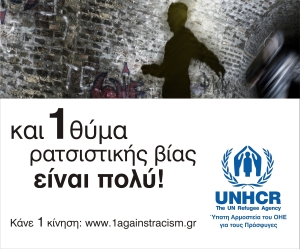Inside Greece's Guantánamo: 'Death by the Taliban is better than this life'
Μάιος 3, 2011Read this Article
Ninety per cent of illegal immigrants in the EU arrive through the Greek-Turkish border – and into the appalling conditions of its detention camps. Yet people keep coming, writes JAMIE SMYTH , Social Affairs Correspondent
HANDS POKE through the bars, frantically waving at us to come closer. Half a dozen faces press against the cell window, all desperate to attract our attention. “Please help us,” shouts a man in his 20s. “The conditions are inhumane. We are 100 in this cell. It’s too crowded.” “I’m from Algeria,” cries another. “It’s dirty in here. I’ve been here five months and 24 days. It’s terrible.”
The shouted conversation across a two-metre-high razor-wire fence lasts only a few minutes. The guards at the Filakio detention centre in northeast Greece run out and tell my translator we have to move on. We are causing a commotion inside the camp and we do not have a permit to talk to the inmates, who are several hundred economic migrants and asylum seekers recently arrived in Greece from Turkey. The Irish Times applied to the police authorities for permission to enter the Filakio centre, but was refused.
When I walk into the centre to ask the guards directly for access it is pretty clear why journalists are barred from the place immigrants have nicknamed Greece’s Guantánamo. The one cell I get a chance to see from the reception area is dingy and overcrowded. Very little light comes through a small barred window. Even at a distance of 10m the stench of urine and sweat is overpowering. Scores of men are squeezed together, either sitting on the floor or standing, with barely room to move. One man sits with his head in his hands.
Several immigrants I later interview in Athens allege that they were maltreated at the centre. “One policeman beat me when I spoke English to him,” says Asif, a 24-year-old Afghan who worked for coalition forces in his home country and was forced, he says, to flee by the Taliban. “I was held for one night there, but I was sick when I got out . . . They treat you like an animal.”
Such claims are impossible to verify, and the Greek authorities deny maltreatment. But a former public official who was involved in establishing the centre admits that the authorities set out to make living conditions harsh. “The idea at first was not to make it humane. If it wasn’t nice, then people wouldn’t want to come,” says George Kourtoglou. “But the places they come from are even worse, so they kept coming. Now we understand it has to be more humane.”
Europe’s top human-rights watchdog last month took the unusual step of issuing a statement about the centre. The Council of Europe said that Filakio provided “filthy, overcrowded, unhygienic, cage-like conditions, with no daily access to outdoor activity” for men, women and children. This could amount to “inhuman and degrading treatment”. Council inspectors also reported they had to step over immigrants to enter overcrowded cells at another Greek detention centre.
Filakio is one of a network of centres in Greece set up to cope with an influx of immigrants in recent years. Last year the authorities arrested 132,524 people entering the country, almost 50,000 of them through the Evros region, which borders Turkey. This amounts to 90 per cent of all the illegal immigrants detained while entering the EU in 2010.
The Greek government, already struggling with the austerity terms of an EU-IMF bailout, says it can’t cope with the daily arrival of between 200 and 300 immigrants. It estimates that there are now 1.2 million immigrants in the country. Most are held in detention in camps for anything up to six months. The majority cannot be deported to their countries of origin – typically Afghanistan, Iraq, Iran, Algeria and Somalia – and are simply released without access to social welfare, food or housing. Thousands move to Athens, where many are destitute.
A backlog of 55,000 undecided asylum cases means it is difficult for immigrants to submit asylum requests. The United Nations High Commission for Refugees (UNHCR) recently warned that the situation in Greece is a humanitarian crisis and that people needing international protection are not getting the chance to apply for it.
Even if asylum seekers get the chance to apply for protection, Greece accepts just 3 per cent of asylum applications. This is the second-lowest rate in the EU, ahead only of Ireland’s 2 per cent rate and below the EU average acceptance rate of 25 per cent.
Most immigrants who manage to enter Greece don’t want to stay there, and attempt to travel on to other EU states, such as Germany, France, Britain or one of the Scandinavian countries.
The situation in Greece is mirrored to a lesser extent in other countries on the EU’s southern border. Italy has been flooded with more than 30,000 immigrants from Tunisia and Libya in recent weeks, following the unrest in north Africa. Malta, Cyprus and Spain are also on Europe’s front line.
These border states are seeking changes to EU rules to enable them to share the burden of incoming economic migrants and asylum seekers with their EU partners. They say that the system is unfair and that greater co- operation between all 27 EU states is urgently needed to cope with immigration flows. This is opposed by countries such as Ireland that do not have an external EU land border and do not want to shoulder the costs of more immigrants. This week France even proposed suspending the EU’s free travel area because of the recent immigrant influx into Italy.
“There is a kind of hypocrisy in Europe by raising these walls in their hearts and policies,” says Anna Dalara, Greece’s deputy minister of labour. “We need to reallocate the burden . . . We can’t turn our country into a concentration camp.”
Dalara says the vast majority of immigrants want to go to other EU states but get stuck in Greece because of the current EU rules. She admits that the Greek asylum system has effectively collapsed but says that the government is introducing reforms to clear the backlog of asylum claims. The aim is to set up new reception centres to screen immigrants, helping to ensure that those in need of asylum are protected.
Among the government’s reforms is a plan to build a wall along a 12.5km stretch of Greece’s land border with Turkey, to try to stem the flow of immigrants. This would be in the area where Asif finished his marathon walk from Afghanistan to Greece last August. It is the only part of the Turkey-Greece border that is not protected by the River Evros, which is fast-flowing in winter and spring and forms a natural barrier to immigrants and asylum seekers.
The proposed wall has been criticised by human-rights groups, which fear it will force immigrants and asylum seekers to take more dangerous routes across the river. The EU commissioner for home affairs, Cecilia Malmström, has also criticised the plan. She claims that the deployment in the area of EU border guards from the Frontex agency is helping to reduce the number of immigrants crossing into Greece.
In the nearby Greek village of Nea Vissa, however, there is strong support for the wall.
“Lots of people are still coming through our village. Yesterday morning a group of 20 or 30 immigrants walked into the village,” says Georgios Paraskevaidis, the owner of a workshop for farm machinery. “We have lots of old people in the village. My mother is 82 years old, and they arrive at her house and beg for food or ask for their mobile phones to be recharged. She gets scared.”
About 200 EU border guards from Frontex are conducting joint patrols with the Greek police in the asparagus and cotton fields on this part of the border with Turkey. “This is the area where the most pressure came last year. We made 36,000 arrests in 2010. The numbers crossing here are now decreasing,” says Georgios Tournakis, a Greek police officer. He takes us on a short patrol with two Frontex officers from Latvia, one of whom has a sniffer dog to help trace immigrants who are hiding in bushes.
“We scan the area using thermal vision cameras at night, and when we locate immigrants we send a patrol to the border and create a human wall in front of them,” Tournakis says. “We shine lights on them and try to get the Turkish border guards to arrest them.”
The Greek police and Frontex have no power to return immigrants once they have crossed the border, however, and Turkey has little incentive to arrest immigrants on its soil. So far Turkey has refused to sign a comprehensive readmission agreement with the EU or Greece to accept illegal immigrants who have passed through its territory into Greece.
The Greek government’s proposed wall could potentially block one route for immigrants. But traffickers, many of whom are based in Turkey and charge people thousands of euro for passage into the EU, have other routes into Greece.
Nirwais, who fled the Taliban in Afghanistan with his wife and three children last year, paid traffickers several thousand euro to to get them into the EU. “We walked for nine hours to the border with Greece,” he says. “The traffickers put us in a rubber dinghy and pushed us across the Evros river. There were lots of us in the boat, and it was leaking. We were lucky to make it across.”
AN HOUR’S DRIVE from the village of Nea Vissa is ample evidence of immigrants crossing the Evros. Kristos, a part-time farmer who owns several fields on the banks of the river, takes us along several trails used by immigrants. Empty bottles, clothes and other rubbish are littered across the trails, which are well worn from the feet of thousands of immigrants. On the riverbank we see at least 10 deflated dinghies. The immigrants and asylum seekers often puncture the boats in case police try to send them back across the river to Turkey.
“A few years ago I came across 50 immigrants huddled here under plastic sheeting. There were whole families with children. They were freezing,” says Kristos, who works at the nearby border post. “Most cross on this side of the border post because the other side is mined.”
Hundreds of immigrants have died in their desperate attempts to reach Europe. Some drown. Some freeze to death in winter. Others are blown apart when trying to cross the minefields that are a consequence of past conflict between Greece and Turkey. The number of immigrant deaths is so large that several Muslim graveyards in nearby towns have refused to bury any more bodies.
Sheikh Mehmet Damadoglu, who preaches in the Greek town of Didymoteicho, near the Turkish border, keeps a record of all the deaths. “The number of refugees grew with the Iraq crisis and the war in Afghanistan,” he says. “Since 99 per cent of the refugees are Muslims, I give them a Muslim burial. It is important to wash their bodies and wrap them in special cloth.”
Damadoglu recently opened a graveyard for illegal immigrants and asylum seekers on the outskirts of Sidiro, a small village in the mountains. The graveyard, which is the size of a football pitch, is bleak. Row upon row of earth mounds signify the graves of about 150 people. No grass is growing here, and the graves are unmarked. Bulldozer tracks criss-cross the site, which has plenty of space for more bodies. “We buried 12 people in January. Just one person came to claim a body. A Kenyan man came to claim his wife’s body. She was a Christian, but we advised him to leave her here because the body was in bad condition,” says Damadoglu.
FOR THE TENS of thousands lucky enough to make it to Greece, life is tough. There is no access to social welfare or housing. Some families with children end up sleeping in parks or in disused railway carriages, scavenging for food from bins. As I arrive to visit to one of the many soup kitchens run by churches in Athens, hungry immigrants are struggling to secure their spot in the long queue for food.
“About 65 per cent of the people who come here have nowhere to sleep. They get no money or food from the state. We give them mattresses and clothes twice a week,” says Nikos Voutsinos, chairman of the Caritas Athens Refugee Programme. “I’ve been here five years, and it’s always been a crisis. But it is worse now.”
The conditions in Greece prompted the European Court of Human Rights to rule in January that the country violated an Afghan asylum seeker’s human rights. The man was transferred to Greece from Belgium under EU rules that force asylum seekers to make their claim for protection in the first EU state they arrive in. On his return to Greece he was imprisoned in a cell with 20 others, with little access to toilet facilities or food. He was later released and left destitute in Athens.
Most EU states have now suspended transfers to Greece, but progress towards a common EU asylum policy by 2012 is stalled because member states without an external EU border fear that changing the rules would attract more asylum seekers.
But for Nirwais, his wife, two sons and daughter, change to the EU and Greek asylum rules can’t come quick enough. They share a small two-bedroom apartment in Athens with 14 other adults and three children. He takes me into one of the bedrooms and pours a cup of mint tea. It is a room of three metres by four metres, which his family shares with another family. On warm days one or two of them sleep on a balcony.
Desperate to escape Athens he paid his last €1,000, from the sale of his home in Afghanistan, to a trafficker to take his family to Italy. They boarded an Italian-bound wooden boat called the Hasan Reis early this year. On January 16th the ship sank in heavy seas near Corfu, with the loss of 22 of its 263 passengers, all Afghans.
“My wife’s brother died when the rescue ship pulled alongside our wooden boat. He got trapped between the two ships. His body has never been found,” says Nirwais, who believes he is now unlikely to escape Greece and give his family a new life. “I think I made the wrong decision in leaving Afghanistan. Death by the Taliban is better than this life. All I wanted was to get an education for my children. But here they can’t even go to school. We are losing hope.”
ΔΗΜΟΣΙΕΥΣΗ
-
 i-RED Ετήσια Έκθεση 2011
i-RED Ετήσια Έκθεση 2011
Μάρτιος 25, 2012
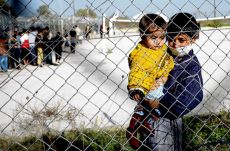
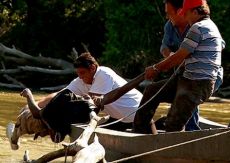
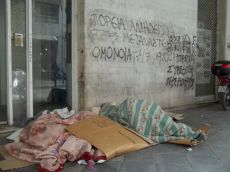
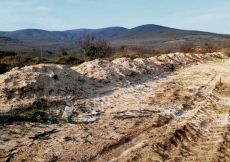
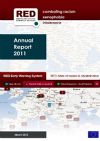 RED Annual Report 2011
RED Annual Report 2011
